 Technology peripherals
Technology peripherals
 AI
AI
 In five years, the computing power required by AI will exceed 1 million times! Twelve organizations jointly published an 88-page article: 'Intelligent computing' is the antidote
In five years, the computing power required by AI will exceed 1 million times! Twelve organizations jointly published an 88-page article: 'Intelligent computing' is the antidote
In five years, the computing power required by AI will exceed 1 million times! Twelve organizations jointly published an 88-page article: 'Intelligent computing' is the antidote
Artificial intelligence is an industry that competes for financial resources. Without high-performance computing equipment, it is impossible to even fine-tune the model, let alone develop a basic model.
But if we only rely on hardware and the current development speed of computing performance, sooner or later we will not be able to meet the growing demand , so we still need Supporting software is used to coordinate and coordinate computing capabilities. At this time, "intelligent computing" technology is needed.
Recently, as many as twelve domestic and foreign research institutions including Zhijiang Laboratory, Chinese Academy of Engineering, National University of Defense Technology, and Zhejiang University jointly published a paper, for the first time A comprehensive survey was conducted on the field of intelligent computing, covering theoretical foundations, technological integration of intelligence and computing, important applications, challenges and future prospects.
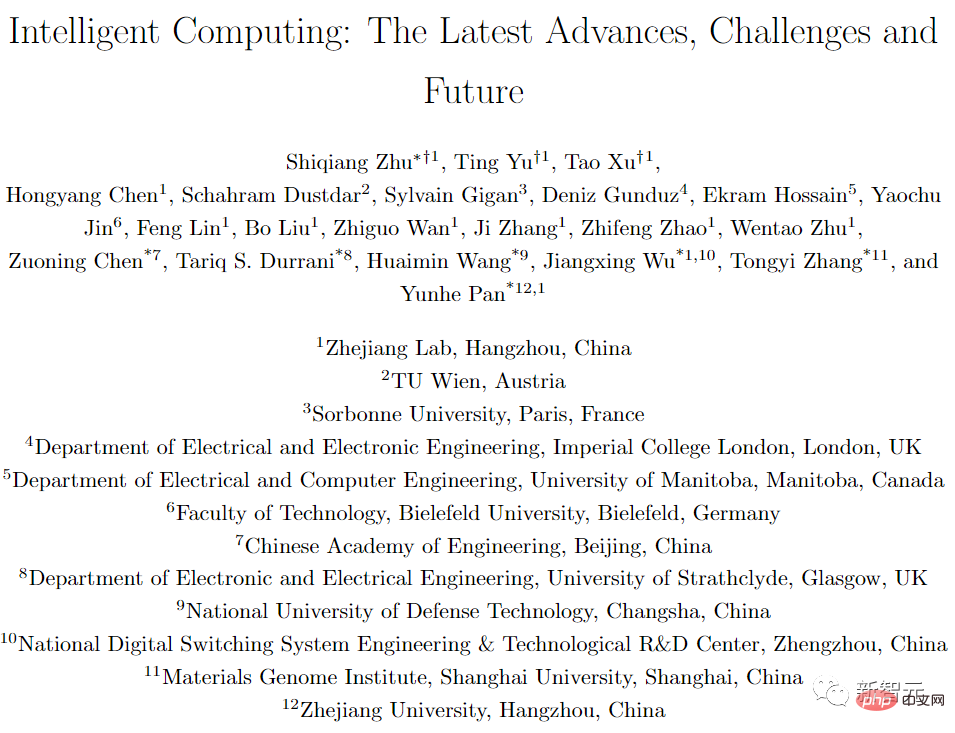
Paper link: https://spj.science.org/doi/10.34133/icomputing.0006
This is also the first review article that formally proposes the definition of intelligent computing and its unified theoretical framework. The full text is structured as follows.
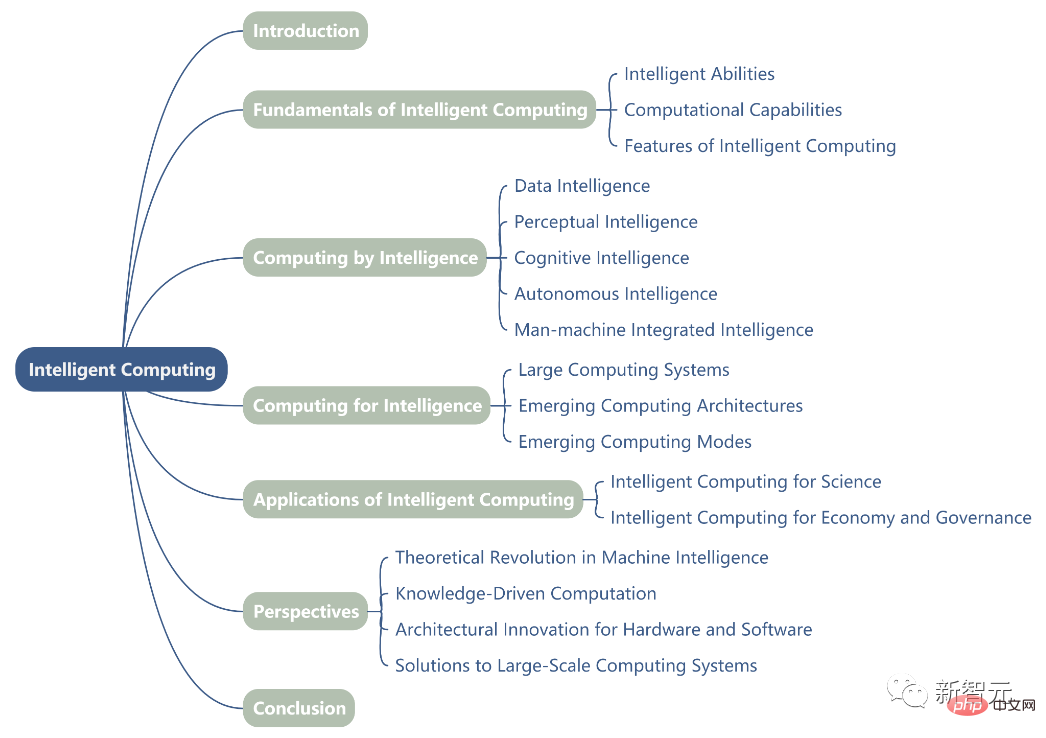 AI opens the era of large-scale computing power
AI opens the era of large-scale computing power
People’s growing interest in intelligent computing, coupled with the development of computing science, intelligent perception of the physical world, and understanding of the cognitive mechanism of human consciousness, have jointly improved the capabilities of computing. The level of intelligence accelerates the discovery and creation of knowledge.
In recent years, computing and information technology have developed rapidly. Due to the unprecedented popularity and success of deep learning, artificial intelligence (AI) has been established as the forefront of human exploration of machine intelligence, and has On this basis, a series of breakthrough research results have been achieved, including:
Convolutional Neural Network (CNN) proposed by Yann LeCun; Yoshua Bengio’s contribution in the field of causal reasoning of deep learning ;Geoffrey Hinton, one of the pioneers of artificial intelligence, proposed the Deep Belief Network (Deep Brief Network) model and backpropagation optimization algorithm in 2006.

In March 2016, AlphaGo, the artificial intelligence Go program launched by DeepMind, competed against the world's top human Go master Lee Sedol, attracting unprecedented attention from around the world. This epoch-making human-machine war It ended with a landslide victory for artificial intelligence and became the catalyst that pushed the wave of artificial intelligence to a whole new level.

For example, GPT-3 has proven that a large model with high structural complexity and a large number of parameters can improve the performance of deep learning. Inspired by GPT-3, a large number of large-scale deep learning models.
Intelligence and Computing
Computing power is one of the important factors supporting intelligent computing.Given the astronomical number of data sources, heterogeneous hardware configurations and changing computing needs in the information society, intelligent computing mainly meets the computing power requirements of intelligent tasks through vertical and horizontal architectures. Vertical architectures are characterized by homogeneous computing infrastructure, mainly improved by applying intelligent methods Resource utilization efficiency to improve computing power. In contrast, horizontal architectureCoordinates and schedules heterogeneous and wide-area computing resources to maximize collaboration Computational efficiency. For example, in April 2020, in response to the computing needs of global COVID-19 research, Folding@home combined 400,000 computing volunteers to achieve 2.5 Exaflops of computing in three weeks The computing power is greater than any supercomputer in the world. Despite the great successes in intelligence and computing, these two fields still face some difficulties. Challenges of Intelligence Artificial intelligence using deep learning is currently in the process of interpretability, versatility, and evolvability. Aspects of sexuality and autonomy remain unresolved. Most current artificial intelligence technologies can only play a weak role compared with human intelligence, and only play a role in specific fields or tasks, achieving powerful and general artificial intelligence. Intelligence still has a long way to go. Finally, there are also major challenges in upgrading from data-based intelligence to more diverse forms of intelligence, including perceptual intelligence, cognitive intelligence, autonomous intelligence, and human-machine fusion intelligence. Theoretical and technical challenges. Computing Challenges The digital wave has brought unprecedented growth in applications, connections, terminals and users, As well as the amount of data generated, huge computing power is required. For example, the computing power required for artificial intelligence doubles every 100 days, that is, it is expected to increase more than 1 million times in the next five years. As Moore's Law wears off, it becomes challenging to keep up with such rapidly increasing computing power requirements. Moore's Law: The number of transistors that can be accommodated on an integrated circuit will double approximately every two years The processing of large-scale tasks in an intelligent society relies on the effective combination of various specific computing resources. The traditional hardware model cannot adapt well to intelligent algorithms, which greatly limits the development of software. . To this day, there is still no widely accepted definition of intelligent computing. Some researchers regard intelligent computing as a combination of artificial intelligence and computing technology, but this view limits the definition of intelligent computing to the field of artificial intelligence, while ignoring the inherent limitations and the important role of triadic interactions between humans, machines and things. Another school of thought regards intelligent computing as computational intelligence, which imitates human or biological intelligence to implement optimal algorithms to solve specific problems, and refers to intelligent computing as computational intelligence. Mainly regarded as an algorithmic innovation. In this paper, the researchers propose a new definition of intelligent computing from the perspective of solving complex scientific and social problems, taking into account the three basic spaces of the world, namely human The increasingly close integration of social space, physical space and information space. Definition of Intelligent Computing Intelligent computing refers to the era of digital civilization that supports world interconnection, including new computing theory methods, architectural systems and technologies areas of competence. Intelligent computing completes computing tasks at the minimum cost based on specific actual needs, matches sufficient computing power, calls the best algorithm, and obtains the best results. The new definition of intelligent computing is proposed in response to the rapidly growing computing needs in the integration of human society, the physical world, and the information space. Intelligent computing is people-oriented and pursues high computing power, high energy efficiency, high intelligence, and high security. Its goal is to provide ubiquitous, efficient, secure, autonomous, reliable and transparent computing services to support large-scale and complex computing tasks. Figure 1 shows the overall theoretical framework of intelligent computing, which embodies various computing paradigms that support human-physical-information integration. First of all, intelligent computing is neither existing computers, cloud computing, edge computing, nor other computing technologies such as neuromorphic computing, optoelectronic computing, and quantum computing. Computing) is not a simple integration. Rather, it is a form of computing that solves real problems by systematically and comprehensively optimizing existing computing methods and resources based on task requirements. In contrast, the existing major computing disciplines, such as supercomputing, cloud computing and edge computing, belong to different fields: supercomputing aims to achieve high computing power, cloud computing Emphasizing cross-platform/device convenience, edge computing pursues service quality and transmission efficiency. Intelligent computing dynamically coordinates data storage, communication and computing between edge computing, cloud computing and super computing fields, building various cross-domain intelligent computing systems to support end-to-end End-to-end cloud collaboration, inter-cloud collaboration and supercomputing interconnection. Intelligent computing should make full use of existing computing technology, and more importantly, promote the formation of new intelligent computing theories, architectures, algorithms and systems. Secondly, the concept of intelligent computing is proposed to solve the problems in the future integration and development of human-physical-information space. With the development of information technology applications in the big data era, the boundaries between physical space, digital space and human society have become increasingly blurred. The human world has evolved into a new space, which is characterized by the close integration of humans, machines and things. Social systems, information systems and the physical environment constitute a dynamically coupled large system. , in this system, people, machines and things are integrated and interacted in a highly complex way, which promotes the development and innovation of new computing technologies and application scenarios in the future. 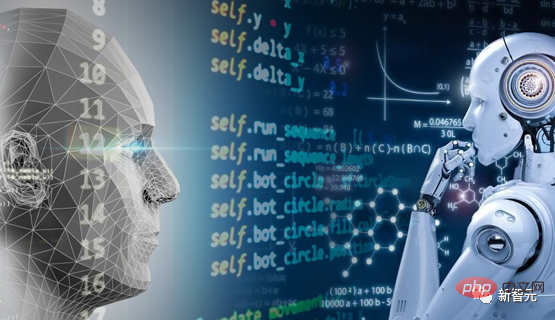
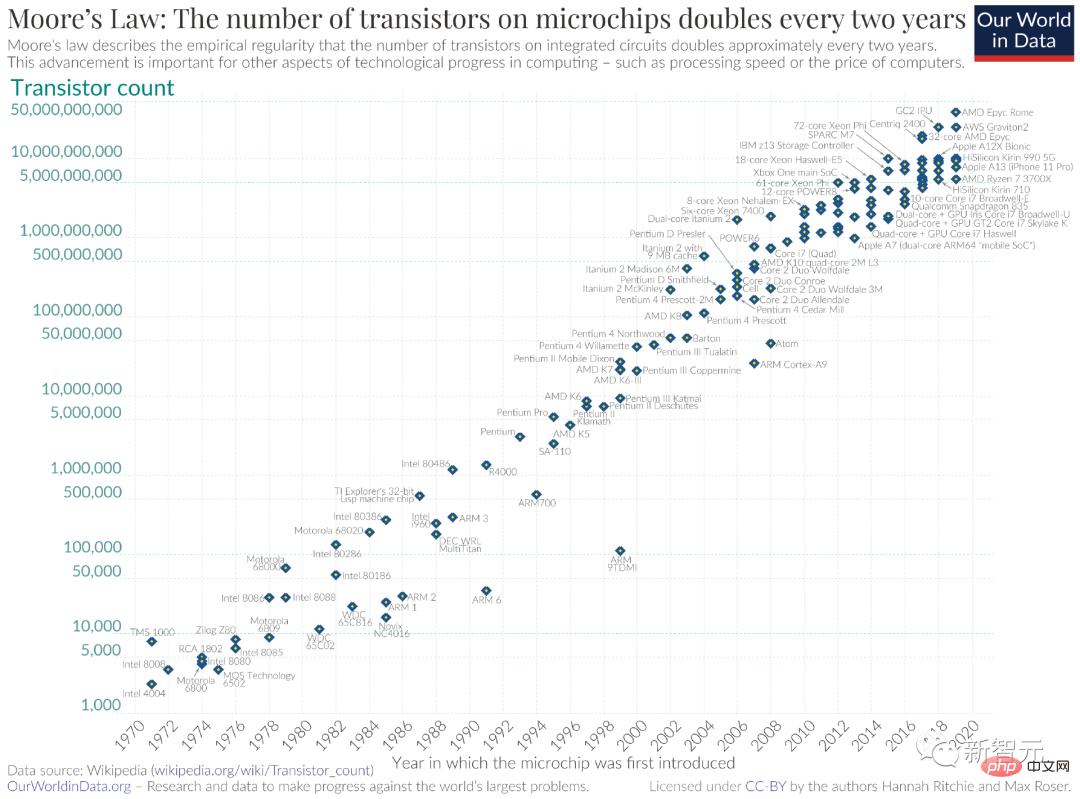
What is intelligent computing?
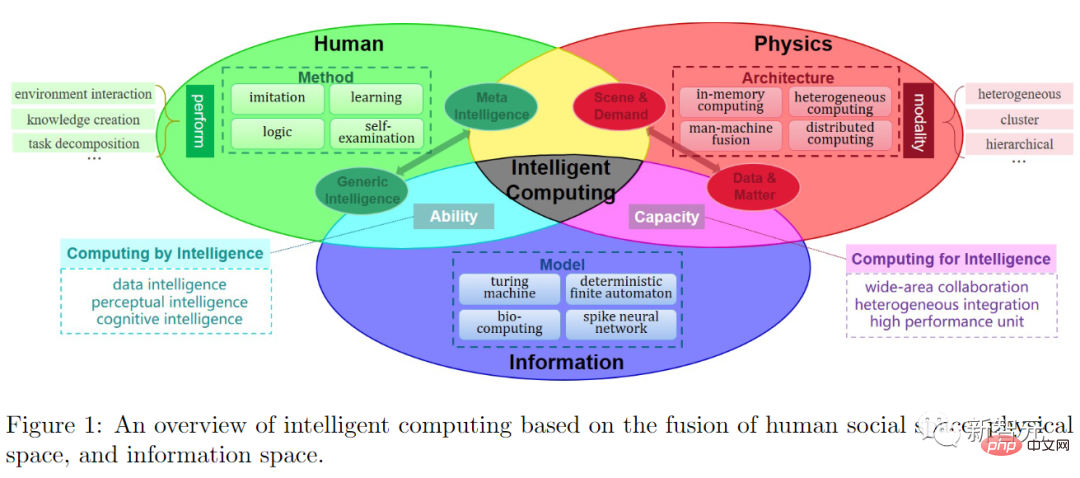
The above is the detailed content of In five years, the computing power required by AI will exceed 1 million times! Twelve organizations jointly published an 88-page article: 'Intelligent computing' is the antidote. For more information, please follow other related articles on the PHP Chinese website!

Hot AI Tools

Undresser.AI Undress
AI-powered app for creating realistic nude photos

AI Clothes Remover
Online AI tool for removing clothes from photos.

Undress AI Tool
Undress images for free

Clothoff.io
AI clothes remover

Video Face Swap
Swap faces in any video effortlessly with our completely free AI face swap tool!

Hot Article

Hot Tools

Notepad++7.3.1
Easy-to-use and free code editor

SublimeText3 Chinese version
Chinese version, very easy to use

Zend Studio 13.0.1
Powerful PHP integrated development environment

Dreamweaver CS6
Visual web development tools

SublimeText3 Mac version
God-level code editing software (SublimeText3)

Hot Topics
 1386
1386
 52
52
 How to define header files for vscode
Apr 15, 2025 pm 09:09 PM
How to define header files for vscode
Apr 15, 2025 pm 09:09 PM
How to define header files using Visual Studio Code? Create a header file and declare symbols in the header file using the .h or .hpp suffix name (such as classes, functions, variables) Compile the program using the #include directive to include the header file in the source file. The header file will be included and the declared symbols are available.
 Do you use c in visual studio code
Apr 15, 2025 pm 08:03 PM
Do you use c in visual studio code
Apr 15, 2025 pm 08:03 PM
Writing C in VS Code is not only feasible, but also efficient and elegant. The key is to install the excellent C/C extension, which provides functions such as code completion, syntax highlighting, and debugging. VS Code's debugging capabilities help you quickly locate bugs, while printf output is an old-fashioned but effective debugging method. In addition, when dynamic memory allocation, the return value should be checked and memory freed to prevent memory leaks, and debugging these issues is convenient in VS Code. Although VS Code cannot directly help with performance optimization, it provides a good development environment for easy analysis of code performance. Good programming habits, readability and maintainability are also crucial. Anyway, VS Code is
 Can vscode run kotlin
Apr 15, 2025 pm 06:57 PM
Can vscode run kotlin
Apr 15, 2025 pm 06:57 PM
Running Kotlin in VS Code requires the following environment configuration: Java Development Kit (JDK) and Kotlin compiler Kotlin-related plugins (such as Kotlin Language and Kotlin Extension for VS Code) create Kotlin files and run code for testing to ensure successful environment configuration
 Which one is better, vscode or visual studio
Apr 15, 2025 pm 08:36 PM
Which one is better, vscode or visual studio
Apr 15, 2025 pm 08:36 PM
Depending on the specific needs and project size, choose the most suitable IDE: large projects (especially C#, C) and complex debugging: Visual Studio, which provides powerful debugging capabilities and perfect support for large projects. Small projects, rapid prototyping, low configuration machines: VS Code, lightweight, fast startup speed, low resource utilization, and extremely high scalability. Ultimately, by trying and experiencing VS Code and Visual Studio, you can find the best solution for you. You can even consider using both for the best results.
 Can vscode be used for java
Apr 15, 2025 pm 08:33 PM
Can vscode be used for java
Apr 15, 2025 pm 08:33 PM
VS Code is absolutely competent for Java development, and its powerful expansion ecosystem provides comprehensive Java development capabilities, including code completion, debugging, version control and building tool integration. In addition, VS Code's lightweight, flexibility and cross-platformity make it better than bloated IDEs. After installing JDK and configuring JAVA_HOME, you can experience VS Code's Java development capabilities by installing "Java Extension Pack" and other extensions, including intelligent code completion, powerful debugging functions, construction tool support, etc. Despite possible compatibility issues or complex project configuration challenges, these issues can be addressed by reading extended documents or searching for solutions online, making the most of VS Code’s
 What does sublime renewal balm mean
Apr 16, 2025 am 08:00 AM
What does sublime renewal balm mean
Apr 16, 2025 am 08:00 AM
Sublime Text is a powerful customizable text editor with advantages and disadvantages. 1. Its powerful scalability allows users to customize editors through plug-ins, such as adding syntax highlighting and Git support; 2. Multiple selection and simultaneous editing functions improve efficiency, such as batch renaming variables; 3. The "Goto Anything" function can quickly jump to a specified line number, file or symbol; but it lacks built-in debugging functions and needs to be implemented by plug-ins, and plug-in management requires caution. Ultimately, the effectiveness of Sublime Text depends on the user's ability to effectively configure and manage it.
 How to beautify json with vscode
Apr 15, 2025 pm 05:06 PM
How to beautify json with vscode
Apr 15, 2025 pm 05:06 PM
Beautifying JSON data in VS Code can be achieved by using the Prettier extension to automatically format JSON files so that key-value pairs are arranged neatly and indented clearly. Configure Prettier formatting rules as needed, such as indentation size, line breaking method, etc. Use the JSON Schema Validator extension to verify the validity of JSON files to ensure data integrity and consistency.
 Can vscode run c
Apr 15, 2025 pm 08:24 PM
Can vscode run c
Apr 15, 2025 pm 08:24 PM
Of course! VS Code integrates IntelliSense, debugger and other functions through the "C/C" extension, so that it has the ability to compile and debug C. You also need to configure a compiler (such as g or clang) and a debugger (in launch.json) to write, run, and debug C code like you would with other IDEs.



